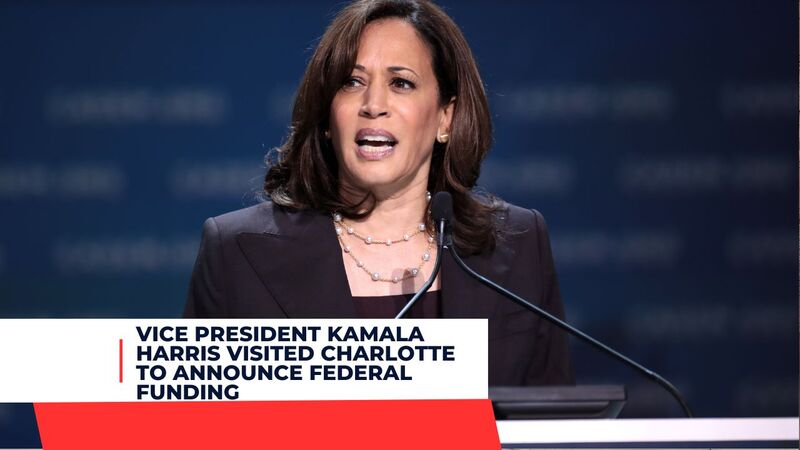Vice President Kamala Harris visited Charlotte Thursday to announce federal funding that will assist schools in hiring additional mental health professionals. Harris made her announcement at Eastway Middle School where she met with students affected by gun violence.
North Carolina will receive $12 million as part of the Bipartisan Safer Communities Act funding, enabling schools across the state to hire 332 counselors statewide.
What is the Bipartisan Safer Communities Act?
The Bipartisan Safer Communities Act (BSCA) offers critical resources to youth mental health. It funds programs to assist schools implement evidence-based school safety initiatives, provides training for the school mental health workforce and increases access to telehealth services.
The Act encourages states to implement red flag laws, which allow certain parties–typically law enforcement officers and family members–to petition courts for temporary removal of firearms from individuals who pose an imminent risk to themselves or others. Furthermore, it creates a federal criminal offense against straw purchasing and trafficking practices which have played a substantial role in gun-related murders.
The National Governors Association will host a three-part briefing series to explore key provisions in BSCA that affect state and territorial governments, such as how best to use mental health funding from this law. The initial briefing, on pediatric mental health, will take place on July 20; click here for more information. Subsequent briefings will address other critical provisions such as enhanced background checks or red flag laws.
Why is the Bipartisan Safer Communities Act so important?
The Bipartisan Safer Communities Act (BSCA), representing meaningful gun reform for over three decades, was passed by Congress and signed into law last year following tragic events in Buffalo and Uvalde, Texas. American Psychological Association members sent nearly 3,000 letters supporting this bill directly to senators who played an instrumental role in its passage.
The bill offers $750 million to states for crisis intervention efforts, including red flag laws. Furthermore, it extends timeframes for investigating juvenile and mental health records of buyers under 21, as well as closing “boyfriend loophole” that allowed those convicted of domestic abuse against current or recent dating partners from purchasing guns.
The bill includes $120 million to fund grant programs to train educators, students and first responders on how to recognize mental illness in young people. This funding is especially critical given that marginalized students disproportionately experience punitive school discipline practices that negatively affect attendance rates, test scores, graduation rates and postsecondary enrollment rates.

How will the Bipartisan Safer Communities Act be used?
The BSCA provides $750 million to implement state-led crisis intervention programs, such as Extreme Risk Protection Orders – commonly referred to as red flag laws – which allow law enforcement and family members to petition courts to temporarily take away firearms when there is clear danger that these loved ones could hurt themselves or others. It also creates federal offenses against straw purchasing and gun trafficking to help prosecutors target illegal gunrunners more effectively.
This legislation allots $250 million to support community violence interventions such as street outreach teams, hospital-based trauma centers and Cure Violence programs to mediate conflicts before they escalate. Furthermore, funding has been increased for the National Suicide Prevention Lifeline to expand access to care via telehealth for Medicaid and Medicare recipients.
While the BSCA provides funding for many key initiatives, it doesn’t address the root causes of gun violence nor protect children from abusive school discipline practices that increase the chance of encountering criminal justice system as adults. Our communities deserve increased investment in school-based solutions that promote safe learning environments while offering alternatives to exclusionary discipline or criminalization.
What will the Bipartisan Safer Communities Act do?
Gun safety measures encompass among others:
Pediatric Mental Health Care Access Program: The bill sets aside $80 million to create and fund a national network of community organizations to offer behavioral health services via telehealth to pediatric primary care providers, intended to aid children who have experienced or witnessed traumatizing events like gun violence, parental incarceration, domestic abuse, natural disasters, interpersonal or community violence and targeted harassment.
The law also allocates funds to states in order to encourage them to enact laws to regulate access to guns and support other school safety initiatives, such as the Safer Communities and Schools Act, while expanding and improving violence intervention programs like Extreme Risk Protection Orders (which temporarily keep firearms away from individuals identified by courts as posing risk to themselves or others) and drug, mental health, and veterans treatment courts – helping prevent suicides and violent acts committed by individuals with untreated mental illnesses.
To know more about recent developments, visit our Alts news website. Thankyou!
- Friday Intraday Trading Sees Nvidia’s stock Market Cap Momentarily Cross $2 Trillion
- Trump’s January 6 Civil Cases Proceed While Criminal Case Is Halted
- Trump Delivers Speech at the Columbia Black Conservative Federation Gala
- Trump Declares Strong Support for IVF Following Alabama Supreme Court Decision
- Schumer in Ukraine Declares US Backing During House Aid Standoff






